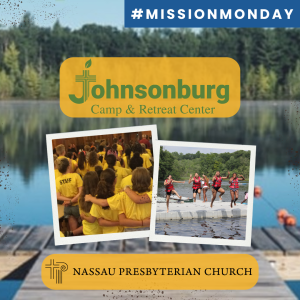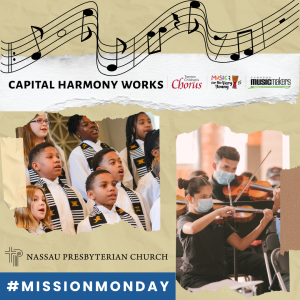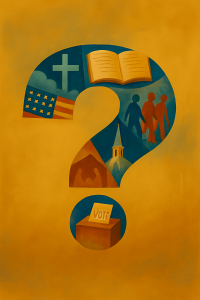Luke 11:5-13
November 16
David A. Davis
Jump to audio
It was only a few loaves of bread. That was all the friend was asking for. The one knocking on the door had a late-arriving visitor at the house. One can imagine that the expectations, the understanding, the norms, and the requirements of hospitality in the world at the time of Jesus were pretty well known and set with a high bar. A traveling friend arrives at your house? Yes, you are going to welcome them with more than open arms. A meal and a place to lay their head would likely be the least one would do, even if the visitor shows up unexpectedly and very late at night. Still, a warm welcome, a meal, and a place to stay.
The parable tells of three friends. The unexpected visitor. The one knocking. The one already in bed. Identified by Jesus as friends implies that the one knocking would surely return the favor if the shoe were on the other foot. If the friend, already asleep with the children, needed some assistance in showing hospitality, the neighbor now at the door would surely help. The traveling friend would no doubt receive and show hospitality and provide a meal, and a place to stay if the knocker was the traveler. It is, after all, a tale of three friends. The shameless persistence of the person at the door asking may be less about just being annoying and more about knowing that they would do the same in a heartbeat for the person inside the door. After all, it was only a few loaves of bread. It’s hardly that much to ask of a friend.
Except… it was midnight. “Suppose one of you has a friend, and you go to him at midnight…”. The Rev. Dr. Martin Luther King’s sermon entitled A Knock At Midnight appears in his book Strength to Love, first published in 1963. Dr. King begins the sermon like this: “Although this parable is concerned with the power of persistent prayer, it may also serve as a basis for our thought concerning many contemporary problems and the role of the church in grappling with them. It is midnight in the parable”, King preaches. “It is also midnight in our world, and the darkness is so deep that we can hardly see which way to turn.”
Martin Luther King builds on the metaphor of midnight throughout the sermon, and with an allegorical take on the parable, the friend already in bed is the church, the Christian. The persistence is the crying need for justice and righteousness in the land. And whether or not to answer at midnight is the question of the church, the Christian’s response of faith in public life. “At midnight,” King writes, “colors lose their distinctiveness and become a sullen shade of grey. Moral principles have lost their distinctiveness.” “Midnight is a confusing hour when it is difficult to be faithful.” King’s sermonic riff on “midnight” has a timelessness to it, almost a constant relevance. Last week, the biblical text from the Sermon on the Mount in Matthew’s gospel spoke of light shining and a city on a hill that can’t be hid. The metaphor of midnight must pretty much be the opposite. The kind of darkness all around that feels like you almost can’t see your hand in front of your face. A darkness that stirs discouragement, pessimism, worry, almost a paralysis when it comes to thinking you can make a difference, you can find a light to shine.
I have told you before about the weekend years ago when a few men from my first congregation were doing some work at our cabin in the Endless Mountains of Pennsylvania. The cabin was unfinished then, and as we settled in for sleep, we were in sleeping bags on the plywood floor. The darkness in a cabin in the woods is the sort of darkness that defines midnight. That night amid the darkness, someone said, “It’s darker with my eyes open than when my eyes are closed.” It’s darker with my eyes open. That’s the midnight Dr. King was describing for the church when the world is knocking with a shameless persistence.
It was only a few loaves of bread. Our Wednesday small group was discussing how it is easy to be discouraged and not be sure how to respond or what to do when the darkness seems so bright. I was reminded of the years when Cathy and I were part of the advisor team with our youth group at the summer gathering at the Presbyterian Conference Center in Montreat, NC. Absolutely every year, long about Wednesday, we would find ourselves in conversations on the porch with kids who thought they were doing enough to save the world. You understand how that happens. A great preacher or keynote speaker tells stories of a young person with a great idea that takes off and goes really well. Working for clean water. Fighting for the environment. Serving urban food deserts. Maybe a video was shown that morning as well, telling of a young person in a far-off place doing something transformational in their community. And what is supposed to be encouraging for a young person in their walk of faith actually does the opposite. Because young people of faith want to let their light shine.
In that conversation on Wednesday, one person said, “I don’t have the gifts that some of our church members do when it comes to making a difference, but I can make food. I know how to make food for lots of people.” I know they do, and I have seen them do it. Another person said, “I am just not sure what my gifts are that can make a difference.” I said, “Oh, I know what your gifts are. But I will wait to share it offline.” Yes, those gifts are already being shared. Another person called attention to how we can pray…constantly. And since we all had our Bibles open or on the screen in front of us, someone else turned to II Corinthians. “We have this treasure in clay jars, so that it may be made clear that this extraordinary power belongs to God and does not come from us. We are afflicted in every way, but not crushed; perplexed, but not driven to despair; persecuted, but not forsaken; struck down, but not destroyed, always carrying in the body the death of Jesus so that the life of Jesus may also be visible in our bodies.”
A knock at midnight and a few loaves of bread. Perhaps the church, the Christian’s response amid the darkness that surrounds us, begins with just a trickle from that stream of the everlasting waters of justice and righteousness. Or in the baby steps of letting love be genuine. Or in loving the smallest acts of kindness, looking to do justice in your little neck of the woods, and quietly striving to walk humbly with your God. For twenty-five years, one day a week, I think it’s Thursdays, as I pull out of the church driveway, I have watched members of the Quaker Meeting of Princeton stand across the street. Only two, maybe three. Different people each week. They stand and pray, holding a sign that says “Prayers for peace”. It was only a few loaves of bread.
Professor Heath Carter has done an incredible job this month leading our adult education series. Even as I can only listen on Mondays to the audio, I can tell he has the room in the palm of his hand. This week’s posted readings on our adult education web page include an article Heath wrote earlier this spring that he titled “A World That Might Yet Be”. He tells the story of Amelia Boynton Robinson. If you have not clicked on this posting yet, I really encourage you to do so. I have listened to Heath tell her story to me from the other side of the lunch table. I have witnessed him tell it in front of a room full of people. He can’t tell about Amelia Boynton Robinson without tears in his eyes. She was an unsung hero who worked in the African American community for voter education and voter rights for more than 30 years, beginning in the 1930s. She was beaten unconscious on the Edmund Pettus Bridge in Selma. She walked across that bridge 50 years later, holding the hand of the first black president of the United States.
In writing about Amelia Boynton Robinson, Dr. Carter concludes with this: “It is important to remember that Boynton Robinson lived not only to see the passage of the Voting Rights Act and the election of the nation’s first Black president, but also the gutting of that same Voting Rights Act in 2013 and the beginnings of a new era of voter suppression. History is not a story of unbroken progress, but rather of fits and starts, forward and back.
In those moments when it seems clear that we’re lurching painfully backwards, I give thanks for the memory of Amelia Boynton Robinson, who inspires me to do the small faithful thing in front of me that day. One never knows what may come. But we can pray, as she did, not just with words, but with hands and feet, for a world in which God’s will is done on earth as it is in heaven. A world that might yet be.”
A small faithful thing in front of me that day. Or a few loaves of bread, maybe even at midnight. “Midnight is a confusing hour when it is difficult to be faithful”, Dr. King proclaimed. And King continued, “The most inspiring word that the church may speak is that no midnight long remains. The weary traveler by midnight who asks for bread is really seeking the dawn. Our eternal message of hope is that dawn will come…..The dawn will come. Disappointment, sorrow, and despair are born at midnight, but morning follows. ‘Weeping may endure for a night,’ says the psalmist, ‘but joy cometh in the morning’”. King concludes his sermon, A Knock at Midnight, like this: “This faith adjourns the assemblies of hopelessness and brings new light into the dark chambers of pessimism”.
Len Scales shared another sermon from Dr. King with her small group this week. He concludes with a similar word of hope: “I get weary every now and then. The future looks difficult and dim, but I’m not worried about it ultimately because I have faith in God. Centuries ago, Jeremiah raised a question, ‘Is there no balm in Gilead? Is there no physician there?’…Centuries later, our slave foreparents came along…They did an amazing thing,” King concludes. “They looked back across the centuries and they took Jeremiah’s question mark and straightened it into an exclamation point..’There is a balm in Gilead to make the wounded whole. There is a balm in Gilead to heal the sin-sick soul.”
By grace, the work of the Holy Spirit, and the righteousness of Jesus Christ, Nassau Presbyterian Church, straightening the exclamation when darkness seems to carry the day, begins with a few loaves of bread, even at midnight. The Gospel of John 1:5 — “The light shines in the darkness and the darkness did not overcome it.” Did not. Shall not. Will Not. Shall never overcome it!







